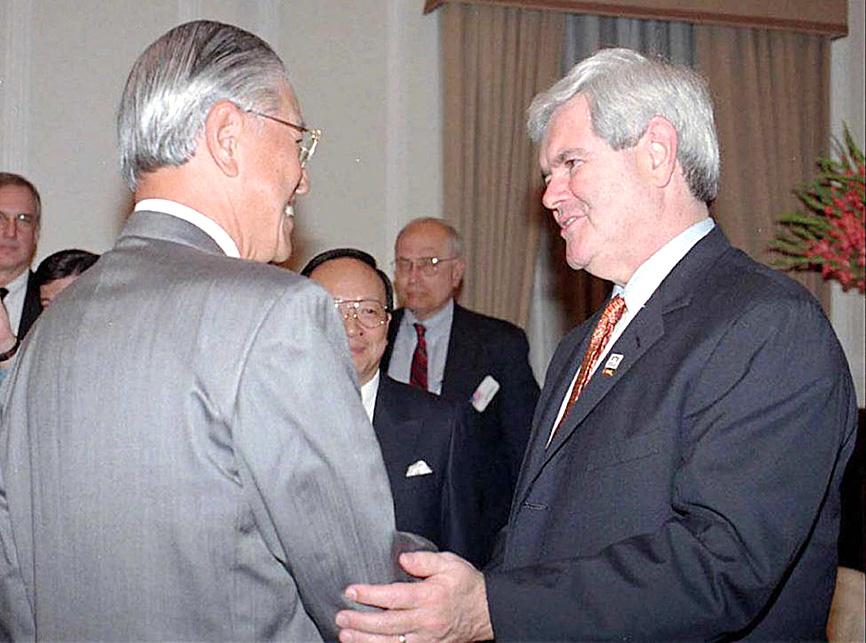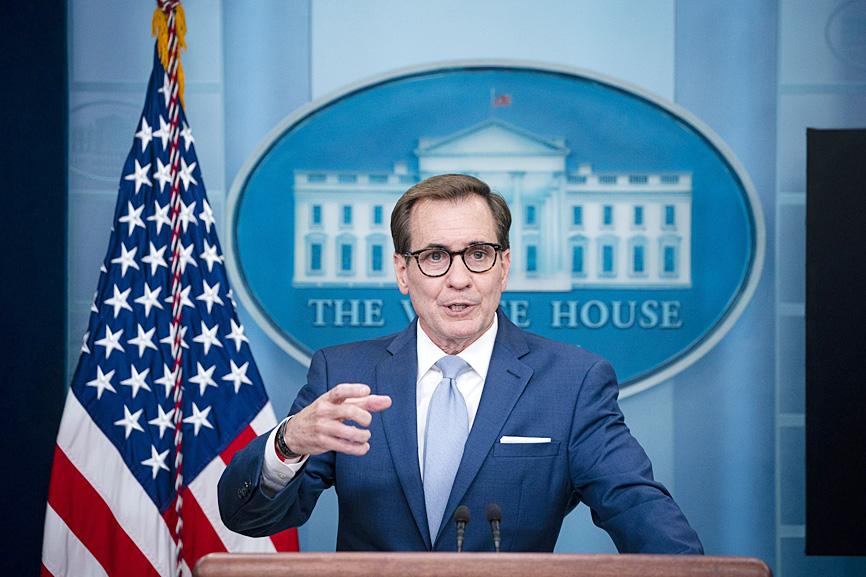More than two dozen Republican US senators on Tuesday voiced their support for US House of Representatives Speaker Nancy Pelosi’s visit to Taiwan, saying that it was consistent with the US’ “one China” policy.
“We support Speaker of the House of Representatives Nancy Pelosi’s trip to Taiwan,” 26 Republican senators said in a joint statement. “For decades, members of the United States Congress, including previous speakers of the House, have traveled to Taiwan.”
Amid strong opposition from China, Pelosi arrived in Taiwan on Tuesday night from Malaysia on the third stop of her tour of Asia, which began on Sunday.

Photo: EDDIE SHIH, AFP
Pelosi is the first sitting US House speaker to visit Taiwan since 1997, when Newt Gingrich traveled to Taipei and met with then-president Lee Teng-hui (李登輝).
“This travel is consistent with the United States’ one China policy to which we are committed,” the senators said. “We are also committed now, more than ever, to all elements of the Taiwan Relations Act.”
The joint statement was issued by US senators Todd Young, Dan Sullivan and 24 others, including US Senate Minority Leader Mitch McConnell, Jim Risch — the ranking member of the Senate Foreign Relations Committee — and Jim Inhofe, the top Republican on the Senate Armed Services Committee.

Photo: Al Drago
However, the Taiwan visit was not unanimously supported in Washington.
US President Joe Biden on July 21 said that “the [US] military thinks it’s not a good idea right now.”
Pelosi defended her visit in a letter to the editor in the Washington Post, saying that the visit showed the US’ commitment to democracy.
“The Taiwan Relations Act set out America’s commitment to a democratic Taiwan, providing the framework for an economic and diplomatic relationship that would quickly flourish into a key partnership,” Pelosi said. “It fostered a deep friendship rooted in shared interests and values: self-determination and self-government, democracy and freedom, human dignity and human rights.”
Pelosi described her visit as that of a US congressional delegation that did not contradict Washington’s “one China” policy.
US National Security Council spokesman John Kirby on Tuesday said that Pelosi has the right to visit Taiwan, adding: “There’s no reason for China to take what is perfectly legitimate and consistent travel by the speaker of the House and turn it into some pretext for amping up the tensions, or creating some sort of crisis or conflict.”
The Chinese response thus far has been “unfortunately right in line with what we had anticipated,” he said, adding that Washington expects China to be preparing to “react over a longer-term horizon.”
“The United States will not seek and does not want a crisis. We are prepared to manage what Beijing chooses to do. At the same time, we will not engage in saber rattling. We will continue to support Taiwan, defend a free and open Indo-Pacific, and seek to maintain communication with Beijing,” he said.
Beyond the military moves, Kirby said China could use "economic coercion" against Taiwan without going into detail.
In other developments, the US Senate Committee on Foreign Relations was today to begin deliberations on a draft Taiwan policy act, which has provisions to give Taipei about US$4.5 billion in security assistance over the next four years.
The bipartisan bill drafted by US senators Robert Menendez and Lindsey Graham additionally stipulates that the US should designate Taiwan as “a major non-NATO ally.”
Further, the bill stipulates that Washington should make preparations for signing a free-trade agreement with Taiwan, among other measures that facilitate “historical, political, economic, cultural and defense ties.”
Additional reporting by Reuters

Taiwan is projected to lose a working-age population of about 6.67 million people in two waves of retirement in the coming years, as the nation confronts accelerating demographic decline and a shortage of younger workers to take their place, the Ministry of the Interior said. Taiwan experienced its largest baby boom between 1958 and 1966, when the population grew by 3.78 million, followed by a second surge of 2.89 million between 1976 and 1982, ministry data showed. In 2023, the first of those baby boom generations — those born in the late 1950s and early 1960s — began to enter retirement, triggering

ECONOMIC BOOST: Should the more than 23 million people eligible for the NT$10,000 handouts spend them the same way as in 2023, GDP could rise 0.5 percent, an official said Universal cash handouts of NT$10,000 (US$330) are to be disbursed late next month at the earliest — including to permanent residents and foreign residents married to Taiwanese — pending legislative approval, the Ministry of Finance said yesterday. The Executive Yuan yesterday approved the Special Act for Strengthening Economic, Social and National Security Resilience in Response to International Circumstances (因應國際情勢強化經濟社會及民生國安韌性特別條例). The NT$550 billion special budget includes NT$236 billion for the cash handouts, plus an additional NT$20 billion set aside as reserve funds, expected to be used to support industries. Handouts might begin one month after the bill is promulgated and would be completed within

The National Development Council (NDC) yesterday unveiled details of new regulations that ease restrictions on foreigners working or living in Taiwan, as part of a bid to attract skilled workers from abroad. The regulations, which could go into effect in the first quarter of next year, stem from amendments to the Act for the Recruitment and Employment of Foreign Professionals (外國專業人才延攬及僱用法) passed by lawmakers on Aug. 29. Students categorized as “overseas compatriots” would be allowed to stay and work in Taiwan in the two years after their graduation without obtaining additional permits, doing away with the evaluation process that is currently required,

IMPORTANT BACKER: China seeks to expel US influence from the Indo-Pacific region and supplant Washington as the global leader, MAC Minister Chiu Chui-cheng said China is preparing for war to seize Taiwan, Mainland Affairs Council (MAC) Minister Chiu Chui-cheng (邱垂正) said in Washington on Friday, warning that Taiwan’s fall would trigger a regional “domino effect” endangering US security. In a speech titled “Maintaining the Peaceful and Stable Status Quo Across the Taiwan Strait is in Line with the Shared Interests of Taiwan and the United States,” Chiu said Taiwan’s strategic importance is “closely tied” to US interests. Geopolitically, Taiwan sits in a “core position” in the first island chain — an arc stretching from Japan, through Taiwan and the Philippines, to Borneo, which is shared by